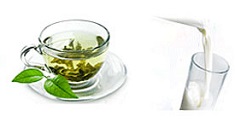Lactose-free UHT milk drinks with functional polyphenols
PROJECT IS COMPLETED
Period: 2014 - 2017
The objective is to establish the specific underlying mechanisms of the interactions between polyphenols and milk proteins and enzymes to determine how polyphenols from different plant sources can reduce off-flavour formation and the loss of nutritional value in lactose-free UHT milk drinks.
Around 70% of the world’s population is unable to digest lactose, and in some African and Asian countries this percentage is even as high as 90%.
The demand for dairy products is rapidly increasing in China, and Chinese consumers are willing to pay a high price for Danish dairy products as they are considered to be safe and of high quality.
New solutions are thus urgently needed to improve the sensory and nutritional quality of lactose-free ultra-high-temperature (UHT) milk in order to meet consumer demands in China.
Limitations on the shelf life of UHT milk are brought about by three different reaction pathways: Maillard reactions; the oxidation of lipids, proteins and amino acids; and proteolysis.

It is hypothesized that the correct choice of polyphenol source and concentration could minimize the oxidation of lipids, proteins and amino acids in lactose-free UHT milk.
A correct choice of plant source and concentration is critical to preserve the nutritional quality of lactose-free UHT milk.
Funded by:

 Project: Lactose-free UHT milk drinks with functional polyphenols
Project: Lactose-free UHT milk drinks with functional polyphenols
Original title: Second generation lactose-free ultra-high-temperature processed milk drinks with functional polyphenols for export markets
Period: August 2014 - August 2017
Grant donor: Innovation Fund Denmark / Arla Foods amba
FOOD grant: DKK 2,909,380
Total budget: DKK 5,847,000
Contact
 Marianne Nissen Lund
Marianne Nissen Lund
Associate professor
Ingredient and Dairy Technology
